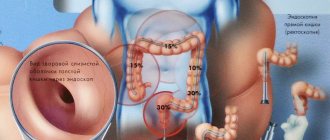Enzyme deficiency in infants
Pathological enzyme deficiency in infants is extremely rare. Why do pediatricians talk about lactase enzyme deficiency in almost every second child? What to do if a carbohydrate test reveals lactase deficiency, and is enzyme deficiency curable in an infant? Alla Anatolyevna Shcherbakova, candidate of medical sciences, pediatrician of the highest category and deputy head of the children's hospital on Savelovskaya in Moscow, has hundreds of the youngest patients, and she says that treatment in such cases is not required. This surprises, but at the same time reassures many parents.
Enzymes (or enzymes)
- These are protein catalysts that take part in a chemical reaction and change its rate.
— Alla Anatolyevna, what is the importance of digestive enzymes for newborns?
— The production of enzymes is carried out by the pancreas. They are involved in the breakdown of nutrients - proteins, fats, carbohydrates. Enzymes have different structures and functions depending on the reaction in which they participate. The breakdown of nutrients into the necessary components allows them to be absorbed into the intestines and further participate in the growth and development of a small child.
Enzymeopathy can cause digestive problems in infants.
— What is the manifestation of enzyme deficiency in children?
— Enzymopathy, or enzyme deficiency, is a lack of enzymes, which can manifest itself, among other things, in disruption of the digestive process. In young children, this is lactase deficiency - a lack of the enzyme lactase, which breaks down milk sugar (lactose) contained in breast milk, dry and liquid milk formulas.
Manifestations and signs of lactase deficiency in a newborn are normal:
| Enzyme deficiency - symptoms to consult a doctor:
|
Most infants experience transient (temporary) lactase deficiency in the first three months. At this age, this is the norm, because the pancreas is still immature and its function is reduced, lactase is slightly lacking. The child's stool is more liquid: we can say that this is how transient lactase deficiency helps to empty the intestines and fights constipation.
If the baby is moderately worried, there is no catastrophe; the problem will go away on its own over time. This is a difficult period in a child’s life that needs to be overcome.
— Are the causes of enzyme deficiency in a baby explainable?
“Nature has come up with the idea that a newborn’s body is able to absorb not all milk sugar, but only part of it. Residues of milk sugar serve as a nutrient substrate for the developing intestinal microbiota and contribute to looser stools.
— What types of enzyme deficiency occur?
— Enzyme deficiency in the gastrointestinal tract can be divided into types depending on the lack of certain enzymes:
- protease - insufficiency of enzymes for the breakdown of proteins;
- lipase - insufficiency of enzymes for the breakdown of fats;
- amylase - insufficiency of enzymes for the breakdown of carbohydrates.
Enzyme deficiency in infants (lactase deficiency)
| Enzyme deficiency in adults
|
Functional lactase deficiency resolves in children aged about three months.
— Despite the fact that reduced enzymatic activity in children is quite physiological, many parents do not calm down until they get tested. How to detect enzyme deficiency in a baby?
— A typical medical test for lactase deficiency in an infant is a stool carbohydrate test, which determines the amount of lactose in the stool. In my practice, I do not order such a study, because even lactose found in feces is the norm for a baby at the age when the pancreas is training its tolerance. And if the child gains weight well, eats well, follows a daily routine, and maintains intervals between feedings, he is healthy.
— Alla Anatolyevna, how to treat enzyme deficiency in a newborn in order to alleviate its manifestations?
— Some doctors prescribe enzymes and multienzymes despite the fact that enzyme (lactase) deficiency in children in the first months of life cannot be treated. It goes away over time as the pancreas grows. And adding the lactase enzyme to baby food does not greatly affect the child’s digestion. If the baby is very restless, it is better to prescribe an additional examination, look for and treat another cause of tummy problems.
Test results do not necessarily mean your child has a condition that needs to be treated.
When the child grows up, the pancreas will begin to produce a sufficient amount of enzymes, milk sugar will be completely digested and transient lactase deficiency will go away.
— When are milk formulas with a name consonant with the problem used—lactose-free?
— It is better to discuss the introduction of any mixture with your doctor. Lactose is involved in the formation of brain galactocerebrosides. This is a necessary component for the growth and full development of the baby. Therefore, you should not feed a lactose-free formula for a long time.
Such mixtures can be used during the acute period of intestinal infection, when the functions of the pancreas are affected, for example, after suffering gastroenteritis of a viral nature. During the recovery period, it is necessary to support digestion - therefore, it is permissible to prescribe a lactose-free nutritional formula. But only for a few days. When the acute period of intestinal infection passes, the mixture is discontinued.
Diet for enzyme deficiency depending on the age and type of feeding of the child
| Children in the first months of life are breastfed and bottle-fed, inactive baby food does not change:
| Children in the second half of life on complementary foods, actively moving, putting everything into their mouth baby food is adjusted:
|
MAMAKO® Premium formula based on goat's milk is suitable for feeding healthy children up to one year old, including babies with transient lactase deficiency.
— How to introduce complementary foods to a child with enzyme deficiency?
— The time for introducing the first complementary foods is considered to be 5.5-6 months. At this age, the pancreas is already growing and begins to produce a sufficient amount of enzymes. Therefore, complaints associated with lactase deficiency are already disappearing, and complementary foods are given to such babies as if they were healthy children. With gradual introduction, these are the same vegetables, cereals, fruit purees, and curds.
Enzyme deficiency is a deficiency of enzymes, including those produced by the pancreas and responsible for digestion. They break down nutrients into components that are easily digested in the intestines. In children in the first months of life, there is often a deficiency of the lactase enzyme, which can digest the milk sugar of breast milk and infant formula. Hence the problems with the tummy and stool. Typically, lactase deficiency is caused by physiological immaturity. It will go away at about three months of age without changing your diet or using any medications.
Pediatrician Alla Anatolyevna Shcherbakova
*The ideal food for an infant is mother's milk. WHO recommends exclusive breastfeeding for the first 6 months. MAMAKO® supports this recommendation. Before introducing new foods into your baby’s diet, consult a specialist.
Classification of the device
There are several degrees of this pathology, determined by IQ:
- mild (moronicity) – IQ 69–50. This form is characterized by slight developmental retardation, which allows a person to socialize in the surrounding society;
- moderate (not pronounced imbecility) – IQ 49–35. Such patients have basic communication skills, are able to understand gestures and respond to them, but it is difficult to understand them when they are worried;
- severe (severe imbecility) – IQ 34–20;
- deep (idiocy) - IQ less than 20. It is characterized by practically undeveloped speech, lack of instincts and primitive reactions. Among the additional manifestations you can notice the following: low or complete lack of coordination of movements, apathy, unjustified malice, anger, etc.
Moronicism is, in turn, divided into three more forms (depending on IQ):
- light – 69–65;
- moderate –64–60;
- heavy – 59–50.
Mental retardation, characterized by a decrease in intelligence, disorders of speech and motor development, and emotional and volitional spheres, is a very common disease. In the world, there are from 1 to 3% of people suffering from this disease. The fact that 75% of them have a mild form can “calm down.”
Quite often, this pathology is combined with other quite serious mental and somatic diseases: Down's disease, cerebral palsy, epilepsy, autistic disorders, blindness, deafness, etc.
UL cannot progress, but with a mild degree, timely educational measures and teaching methods can even increase intelligence.
Prevention and treatment
In order to prevent the development of mental retardation in the womb, pregnant women who have an unfavorable history (physiological indicators, predisposition) are recommended to undergo a more thorough examination. Doctors place women under special observation who suffered from viral diseases during pregnancy.
Birth injuries received by newborns, as well as infectious diseases they suffered at an early age, can lead to brain damage.
A child with mild mental retardation has the opportunity to develop and learn within the limits of his biological capabilities. This pathology is incurable, but its timely and competent correction will make it possible for such a person to become a full-fledged member of society, albeit with limited abilities. A special role in this case is played by the environment and perception. There is no doubt that such people require increased attention.
Mental retardation requires close contact with loved ones, teachers, doctors, and psychologists. The doctor selects specialized institutions for children with mental development problems taking into account the child’s capabilities and abilities. Additionally, the psychotherapist can prescribe medication support using pharmacological drugs. Medical and educational measures and labor training for the mentally retarded show good results.
It is always important to remember that any mental illness is not a death sentence. The main thing is to contact a specialist in time, who will help make your stay in society as comfortable and fruitful as possible for the patient.
In the case of mild oligophrenia, experts give a relatively favorable prognosis. This applies to cases not burdened with concomitant psychopathological and somatoneurological disorders. People with such deviations are quite capable of mastering certain types of professions, can adapt to independent living, and even create families.










